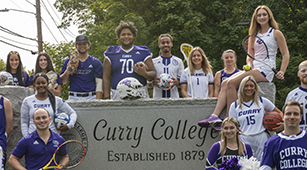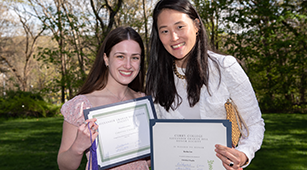Schedule an appointment to meet with Career & Experiential Learning about your area of interest.
Make an AppointmentContact Financial Aid
- 617-333-2354
- fin-aid@curry.edu
- 79C Atherton St.
In order to receive consideration for any of these programs, you must complete a FAFSA annually. You can file your FAFSA form for 2025-2026 beginning December 1, 2024 online at studentaid.gov.
For additional information about Federal financial aid programs view the U.S. Department of Education Student Guide
A federally funded program that uses a standard formula, established by Congress, to evaluate the information you report on your FAFSA and determine your Pell Grant eligibility. These funds are awarded to undergraduate students with exceptional financial need who are pursuing their first bachelor's degree. Pell Grant funding is set by the federal government each year. Current awards range from a minimum of $740 to a maximum of $7,395 for the academic year 2025-2026 and are based on enrollment status. Students are required to complete a FAFSA annually for consideration. Funds are credited to the student's account approximately two weeks after the end of the add/drop period for the semester.
A federally funded program for students with calculated exceptional need and are subject to the availability of funds. Priority is given to students who receive Federal Pell Grants. Award amounts depend on a student's need and the level of funding received by the College. Grants range from a minimum of $100 to a maximum of $4,000. Students are required to complete a FAFSA annually for consideration. Funds are credited to the student's account approximately one week after the end of the add/drop period for the semester.
The Teacher Education Assistance for College and Higher Education (TEACH) Grant Program provides up to $4,000 per year in grants for graduate and undergraduate students who intend to teach full-time in high-need subject areas for at least four years at schools that serve students from low-income families. Undergraduates may receive up to $16,000 and graduate students up to $8,000. Students enrolled less than full-time are eligible, but the maximum grant will be reduced. The grant is also available for post-baccalaureate teacher certification coursework. This grant may be subject to federal sequestions reductions.
Students are required to complete a FAFSA annually for consideration. Funds are credited to the student's account approximately one week after the end of the add/drop period for the semester.
If you fail to complete the four-year teaching obligation, you will have to repay the grant as a loan with interest calculated retroactively to the date when the grant was disbursed.
Student Eligibility and Application Requirements
Each year, before a TEACH Grant can be disbursed, you must do the following:
- Complete the Free Application for Federal Student Aid (FAFSA), although you do not have to demonstrate financial need.
- Meet the eligibility requirements for federal student aid. You must be a U.S. citizen or eligible non-citizen.
- Enroll in a program of study designated as TEACH Grant-eligible. Eligible programs are those that prepare a student to teach in a high-need area.
- Meet one of the following academic achievement requirements:
- Score above the 75th percentile on a college admissions test (e.g., SAT, ACT, GRE).
- Graduate from high school with a cumulative GPA of at least 3.25 (on a 4.0 scale) to receive a grant as a freshman.
- Earn a cumulative GPA of at least 3.25 (on a 4.0 scale) for your college coursework to receive a grant for each subsequent term.
- Complete TEACH Grant counseling by making an appointment with Student Financial Services.
- Sign a TEACH Grant "Agreement to Serve". Respond the U.S. Department of Education's requests to confirm your continuing intention to meet the teaching obligation.
TEACH Grant Agreement to Serve and Promise to Pay
You must sign a TEACH Grant "Agreement to Serve" and "Promise to Pay" (service agreement) each year you receive a TEACH Grant. Both forms are available online on the Department of Education's website.
The TEACH Grant service agreement specifies the conditions under which the grant will be awarded, the teaching service requirements, and your acknowledgment that if you do not meet the teaching service requirements, you must repay the grant as a Federal Direct Unsubsidized Loan with interest accrued from the date the grant funds were first disbursed.
Teaching Obligation
To avoid repaying the TEACH Grant with interest you must be a highly-qualified, full-time teacher in a high-need subject area for at least four years at a school serving low-income students. You must complete the four years of teaching within eight years of finishing your TEACH grant-funded program. You incur a four-year teaching obligation for each educational program for which you received TEACH Grant funds, although you may work off multiple four-year obligations simultaneously under certain circumstances. Specific definitions of these terms are included below.
Highly-Qualified Teacher
You must perform the teaching service as a highly-qualified teacher, which is defined by federal law.
Full-Time Teacher
You must meet the state's definition of a full time teacher and spend the majority (at least 51 percent) of your time teaching one of the high-need subject areas. Elementary teachers who teach many subjects would not be able to fulfill their service agreement.
High-Need Subject Areas:
- Bilingual Education and English Language Acquisition
- Foreign Language
- Mathematics
- Reading Specialist
- Science
- Special Education
Other teacher shortage areas are listed in the Department of Education's Annual Teacher Shortage Area Nationwide Listing.
Schools Serving Low-Income Students
Schools serving low-income students include any elementary or secondary school that is listed in the Department of Education's Annual Directory of Designated Low-Income Schools for Teacher Cancellation Benefits.
Documentation
You must respond promptly to all requests for information or documentation from the U.S. Department of Education. You will be asked regularly while in of out school to confirm that you either intend to teach or that you are teaching as required. You must provide documentation to the U.S. Department of Education at the end of each year of teaching.
If you temporarily cease enrollment in your program of study or if you encounter situations that affect your ability to begin or to continue teaching, you will need to stay in touch with the U.S. Department of Education to avoid your grants being converted to loans before you are able to complete your teaching obligation.
Failure to complete the teaching obligation, respond to requests for information, or properly document your teaching service will cause the TEACH Grant to be permanently converted to a loan with interest. Once a grant is converted to a loan, it cannot be converted back to a grant.
For More Information, contact Curry College's Student Financial Services at 617-333-2354.





